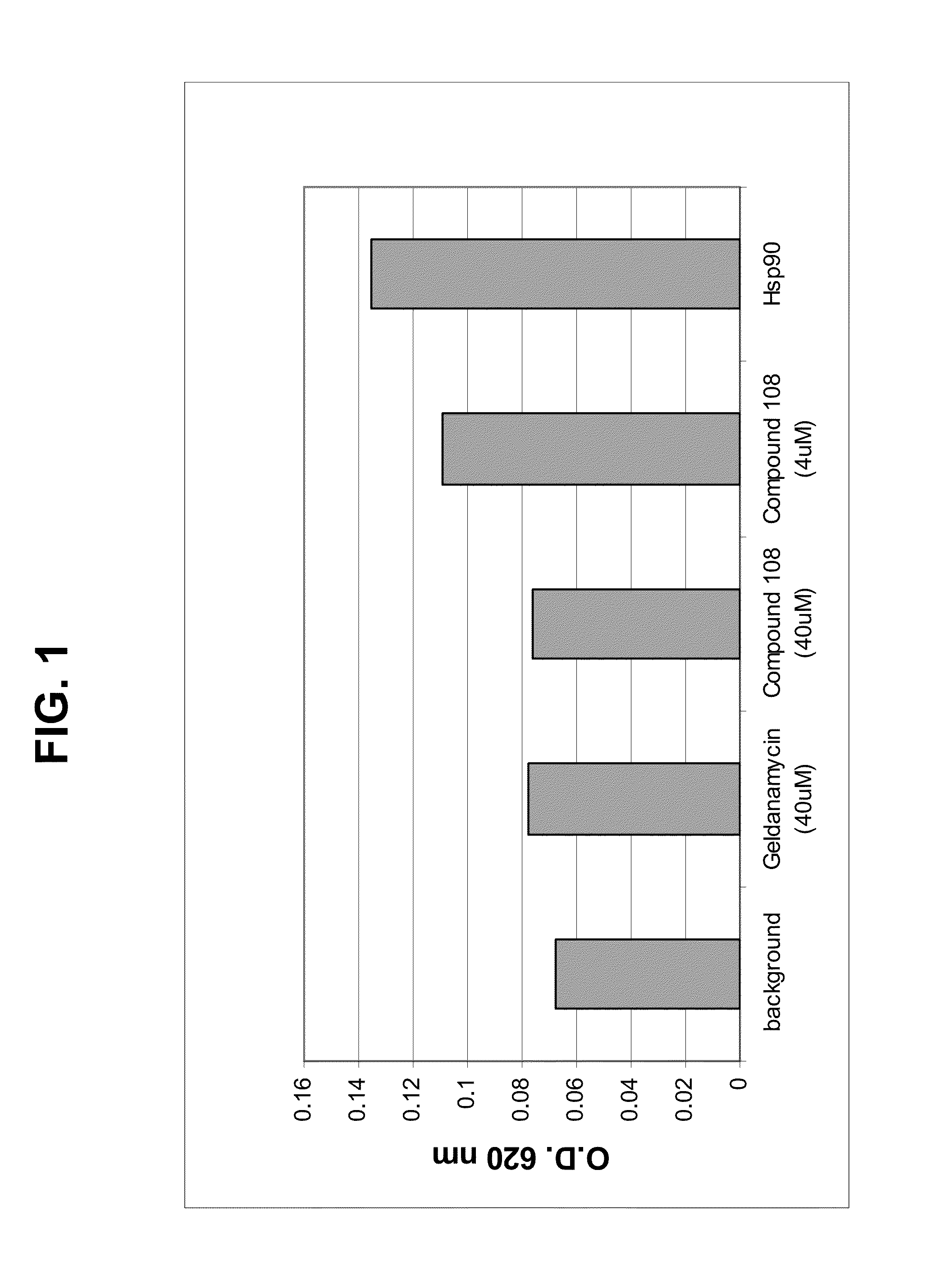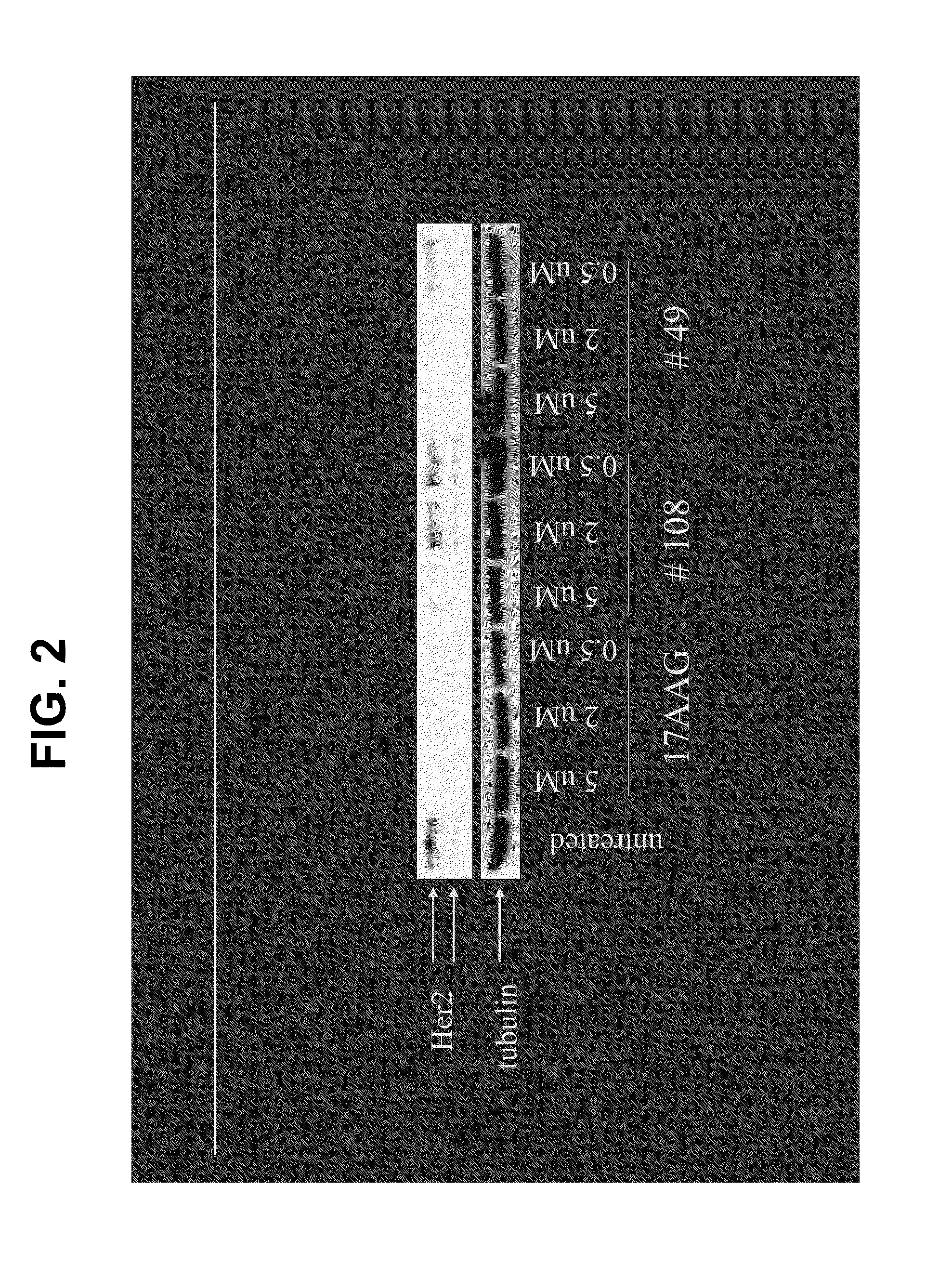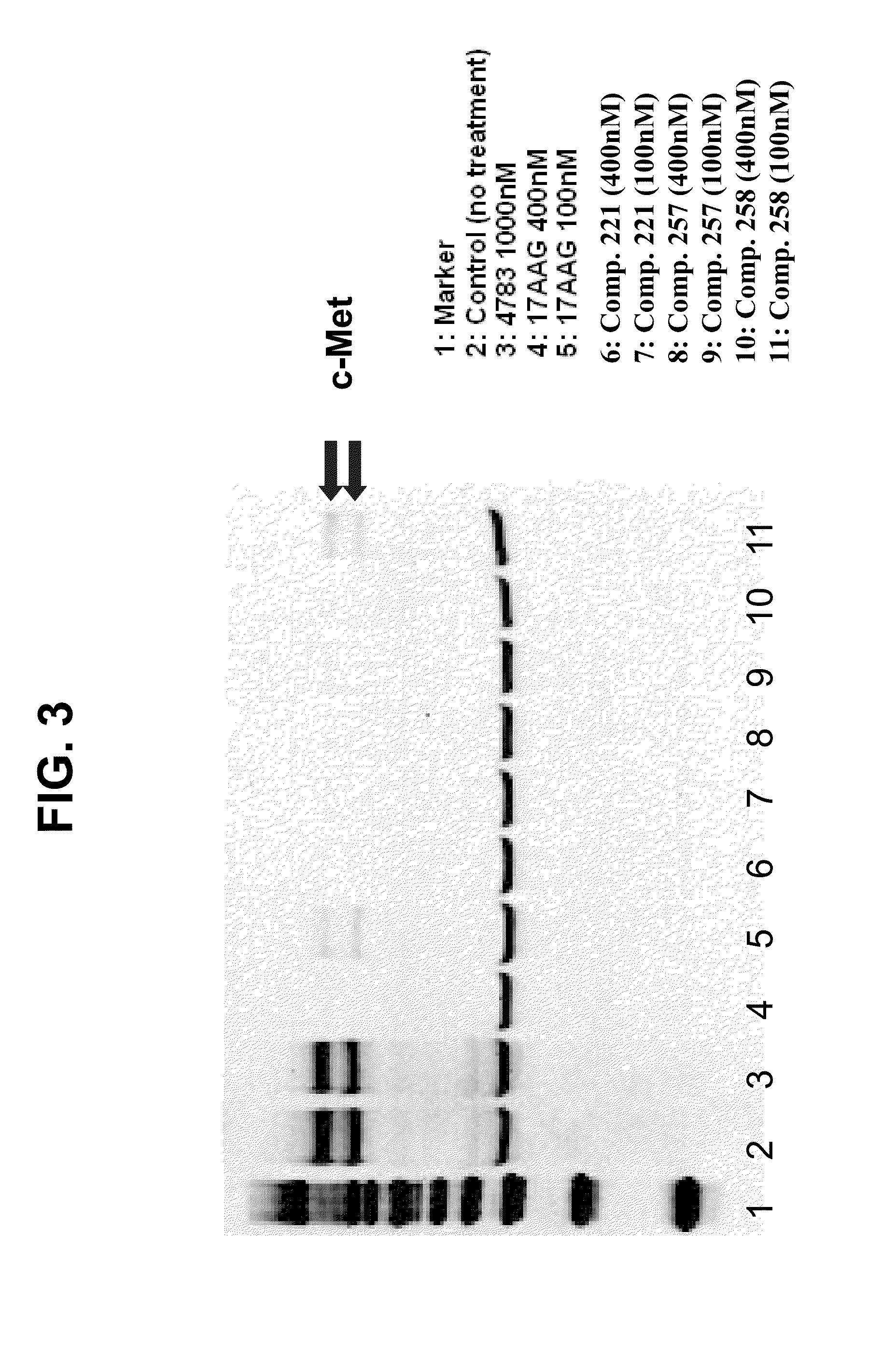Method for treating proliferative disorders associated with mutations in c-met
a technology of c-met and proliferative disorders, which is applied in the direction of biocide, heterocyclic compound active ingredients, drug compositions, etc., can solve the problems of poor prognosis, unsatisfactory current chemotherapy, and poor prognosis for the majority of patients diagnosed with cancer, and achieves poor prognosis. , the expression of c-met is associated with poor prognosis
- Summary
- Abstract
- Description
- Claims
- Application Information
AI Technical Summary
Benefits of technology
Problems solved by technology
Method used
Image
Examples
example 1
Synthesis of Compound 76
[0871]
[0872]The hydrazide (M) (1.45 g, 7.39 mmol) and the isothiocyanate (N) (1.59 g, 7.39 mmol) were dissolved in ethanol (20 ml) with heating. When the starting materials were dissolved the solution was allowed to cool to room temperature and a precipitate formed. This precipitate was filtered then washed with ether to provide the intermediate (P) as a white solid (2.85 g, 97%). The intermediate (VII) (1.89 g, 4.77 mmol) was heated in a solution of sodium hydroxide (0.38 g, 9.54 mmol) in water (20 mL) at 110° C. for 2 hours. The solution was allowed to cool to room temperature then acidified with conc. HCl. The resulting precipitate was filtered then washed with water (100 mL) and dried. The crude product was recrystallized from ethanol to produce compound 76 as a white solid (1.4 g, 75%).
[0873]1H NMR (DMSO-d6) δ 9.43-9.53 (bs, 2H), 8.11-8.16 (m, 1H), 7.47-7.55 (m, 2H), 7.38 (d, J=8.1 Hz, 1H), 7.31-7.36 (m, 1H), 6.98 (d, J=8.1 Hz, 1H), 6.71 (s, 1H), 6.17 (s...
example 2
Synthesis of Compound 124
[0874]3-(2,4-Dihydroxy-phenyl)-4-(naphthalen-1-yl)-5-mercapto-triazole (505 mg, 1.5 mmol), which is commercially available from Scientific Exchange, Inc., Center Ossipee, N.H. 03814, and Et3N (0.84 ml, 6.0 mmol) in 15 ml CH2Cl2 were treated dropwise with ethyl isocyanate (360 mg, 5.0 mmol) at 0° C. The mixture was then warmed to room temperature and stirred for 3 h. The reaction mixture was diluted with CH2Cl2, washed with H2O and saturated brine, dried with Na2SO4, and concentrated in vacuo. The residue was chromatographed (Hexane / EtOAc 3:1) to give Compound 124 as a white solid (480 mg, 58%).
[0875]1H-NMR (CDCl3) δ 10.13 (s, 1H), 7.96 (d, J=9.0 Hz, 2H), 7.61-7.57 (m, 3H), 7.49-7.36 (m, 2H), 7.01 (s, 1H), 6.88 (d, J=8.4 Hz, 1H), 6.70 (d, J=8.4 Hz, 1H), 4.98-4.96 (m, 2H), 3.56 (q, J=7.2 Hz, J=12.6 Hz, 2H), 3.28-3.10 (m, 4H), 1.33 (t, J=7.2 Hz, 3H), 1.13 (q, J=15.0 Hz, J=7.2 Hz, 6H);
[0876]ESMS calculated for C2H28N6O5S: 548.18. Found: 549.1 (M+1)+.
example 3
Synthesis of Compound 188
[0877]
1-Benzenesulfonyl-7-methoxy-1H-indole (Q)
[0878]To a solution of 7-methoxyindole (1 eq) in DMF cooled in an ice bath was added NaH (60% dispersion in oil, 1.2 eq). The reaction was stirred for 1 hr at room temperature then recooled in an ice bath. Benzenesulfonyl chloride (1.1 eq) was added then the reaction was stirred for 2 hrs at room temperature. Water / ethyl acetate were added and the ethyl acetate layer was washed repeatedly (3x) with water. The ethyl acetate layer was concentrated and evaporated to dryness.
1-Benzenesulfonyl-7-methoxy-4-nitro-1H-indole (R)
[0879]To a solution of 1-benzenesulfonyl-7-methoxy-1H-indole (Q) (1 eq) in dichloromethane cooled in an ice bath was added SiO2—HNO3 (2 wt eq) in small portions. The reaction was stirred for 1 hr at room temperature. Activated carbon (2 wt eq) was added then the entire mixture was stirred for 1 hr. The mixture was then filtered and evaporated to dryness. Separation of the isomers was achieved by c...
PUM
 Login to View More
Login to View More Abstract
Description
Claims
Application Information
 Login to View More
Login to View More - R&D
- Intellectual Property
- Life Sciences
- Materials
- Tech Scout
- Unparalleled Data Quality
- Higher Quality Content
- 60% Fewer Hallucinations
Browse by: Latest US Patents, China's latest patents, Technical Efficacy Thesaurus, Application Domain, Technology Topic, Popular Technical Reports.
© 2025 PatSnap. All rights reserved.Legal|Privacy policy|Modern Slavery Act Transparency Statement|Sitemap|About US| Contact US: help@patsnap.com



